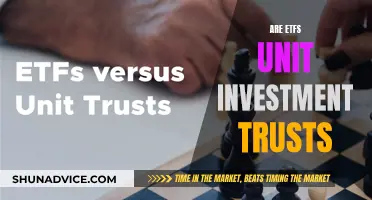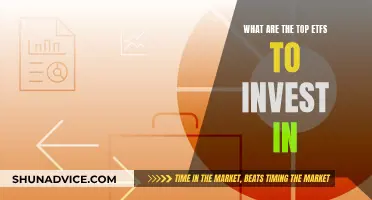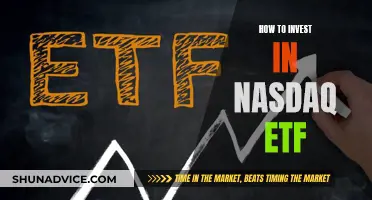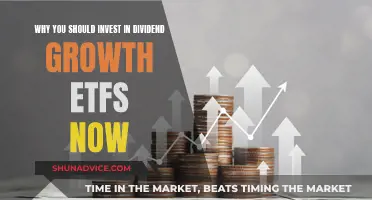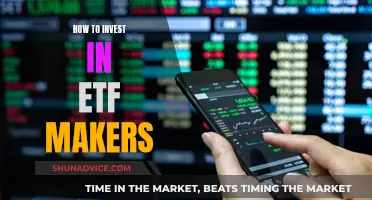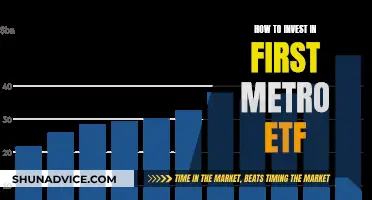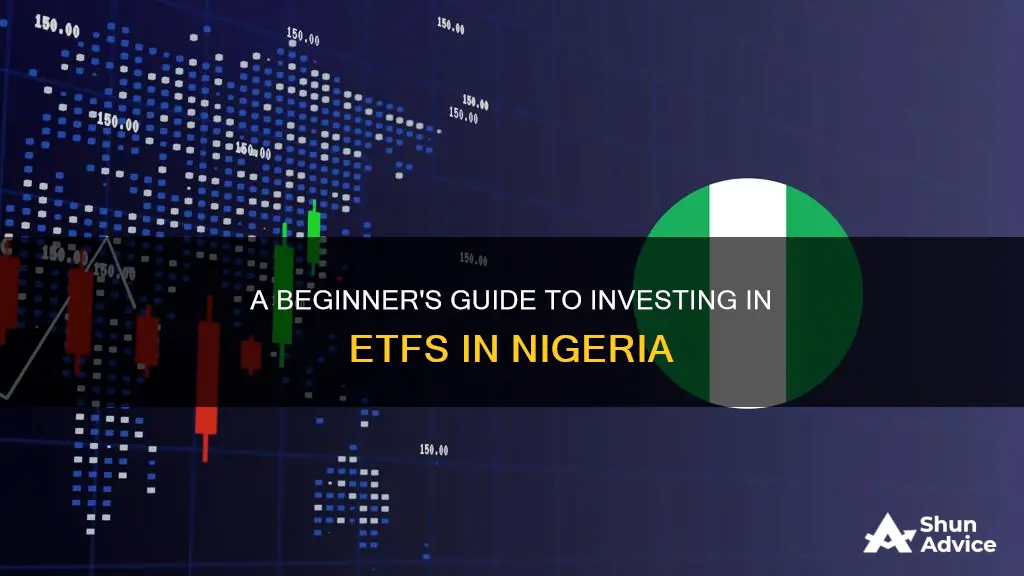
Exchange-Traded Funds (ETFs) are securities that track the performance of an index or basket of assets, such as shares, bonds, and commodities. They are listed on an exchange and traded like stocks. ETFs are a type of investment fund that provides investors with the opportunity to diversify their investments, minimise risk, and maximise returns. While there are currently no Nigeria ETFs open in the market, there are several U.S.-listed equity ETFs that maintain significant exposure to stocks listed in Nigeria. In this article, we will explore the benefits of investing in ETFs, provide an overview of the Nigerian ETF market, and offer a step-by-step guide on how to invest in ETFs in Nigeria.
| Characteristics | Values |
|---|---|
| ETF Type | Exchange-Traded Product, Investment Fund |
| Investment Options | International Markets, Country-Specific, Asset-Specific |
| Trading Platform | Nigerian Exchange (NGX) |
| Investment Benefits | Diversification, Capital Appreciation, Savings, Collateral |
| Investment Risks | Very Aggressive |
| Investment Costs | Commission Rates, Buying/Selling Costs, CSCS Alert Fee |
| Investment Process | Purchase Units via Stockbroker, Contact Fund Manager |
| Investment Redemption | Sell Units via Stockbroker, Contact Fund Manager |
What You'll Learn

The benefits of investing in ETFs
Exchange-Traded Funds (ETFs) are a great way to invest your money and diversify your portfolio. Here are some of the benefits of investing in ETFs in Nigeria:
Diversification of Risks
ETFs help you spread investment risk over multiple securities, reducing stock-specific risk. By investing in an ETF, you are exposed to a series of investment strategies and asset classes, which can include local fixed-income securities, local equities, international markets, currencies, and commodities. This diversification minimizes risk and maximizes returns, as investing in only one asset class is highly risky and can lead to significant losses.
Capital Appreciation
ETFs offer the potential for capital appreciation, which is a rise in your investment's market price compared to its purchase price.
Periodic Dividends
ETFs often provide periodic dividends declared by the companies they invest in, offering a steady income stream.
Collateral
ETFs can be used as collateral for credit facilities, providing a way to access additional funds when needed.
Savings
Investing in ETFs is a way to save idle funds, as they have no set-up costs and provide a competitive commission rate.
Access to Foreign Markets
Some ETFs comprise a basket of both local and foreign-based assets, providing a relatively cheap and easy avenue for investors to enter foreign markets.
Benchmark Returns
Certain ETFs can be used to benchmark a particular sector or mirror a category of asset classes, allowing investors to seek benchmark returns at a minimal cost.
Professional Management
ETFs are often packaged and managed by professionals who are familiar with the products and market volatilities, helping to minimize the risks associated with such investments.
Liquidity
Since ETFs trade like stocks, they offer liquidity, making it easy to buy and sell units as needed.
Broad Exposure
The Nigerian Exchange (NGX) is a leading ETF market in West Africa, offering exposure to various sectors and asset classes, including equities, bonds, commodities, and more.
Overall, investing in ETFs in Nigeria offers a range of benefits, including diversification, potential capital appreciation, periodic dividends, and access to foreign markets and benchmark returns.
Fidelity's X Shares ETF Strategy: Pros and Cons
You may want to see also

How to buy and sell ETF units
Before buying or selling ETF units, it is important to engage a financial professional to discuss your objectives, risk appetite, and style, as well as to guide you through the product options and set up the required account.
To buy ETF units, you can purchase them directly from the floor of the Nigerian Exchange (NGX) through a stockbroker. If units are not available for sale on the floor of the NGX, you can request the creation of units by contacting the relevant fund manager or stockbroker via email.
To sell ETF units, you can do so directly on the floor of the NGX through a stockbroker. If there is no willing seller on the floor, you can request that the underlying securities be credited to your CSCS (Central Securities Clearing System) account by contacting the relevant fund manager or stockbroker via email.
It is important to note that the liquidity for ETFs is a function of the underlying securities. This means that the ease of buying or selling ETF units depends on the liquidity of the individual securities that the ETF tracks.
Additionally, when buying or selling ETF units, there may be associated costs such as commission rates, CSCS alert fees, and VAT. These costs can vary depending on the stockbroking house you choose to work with.
Finally, keep in mind that ETFs are traded like stocks, and you can dispose of your investment whenever you wish in line with the relevant policies.
BRICS ETF: A Smart Investment Strategy for Global Diversification
You may want to see also

The different types of ETFs available
There are several types of ETFs available to investors, each offering exposure to different asset classes, markets, and investment strategies. Here are some of the common types of ETFs:
- Equity ETFs: These are a diverse group of ETFs that can own stocks in companies from around the world or focus on specific regions, sectors, or company characteristics. Examples include international ETFs, sector ETFs, dividend ETFs, and market-cap index ETFs.
- Bond/Fixed-Income ETFs: These ETFs invest in fixed-income securities such as bonds, providing a more stable income stream and reducing portfolio volatility. Examples include government, municipal, corporate, and emerging market bond ETFs.
- Commodity ETFs: These ETFs invest in raw materials and commodities, such as agricultural goods, energy, and precious metals. They tend to be higher risk and are not suitable for all investors.
- Currency ETFs: These ETFs track the performance of specific currencies or a basket of currencies, providing a hedge against currency fluctuations.
- Real Estate ETFs: Also known as REIT ETFs, these funds invest in real estate and are known for their high yield. They are required to distribute at least 90% of their taxable income to shareholders.
- Actively Managed ETFs: While most ETFs are passively managed, following a published index, actively managed ETFs have a portfolio manager making investment decisions. These ETFs may shield their full portfolio holdings and only reveal them periodically.
- Smart Beta, Factor-Based, and Fundamental ETFs: These ETFs track indices based on strategies other than traditional market-cap-weighted indices, using alternative approaches to select and weight securities.
- ESG ETFs: These ETFs incorporate environmental, social, and corporate governance (ESG) considerations into their investment approach, allowing investors to support issues that are important to them.
- Country-Specific ETFs: These ETFs allow investors to track country-specific indices and gain exposure to specific regions or markets, such as the Nigerian market.
- Aggressive Funds: These funds aim to provide liquidity and ensure attractive returns over the long term, with a "very aggressive" risk profile.
- Infrastructure Funds: Infrastructure funds, such as the UPDC Real Estate Investment Trust (REIT), focus on investing in infrastructure-related assets.
Vanguard ETF Minimum Investments: How Much to Invest?
You may want to see also

The risks of investing in ETFs
Like all investments, ETFs come with a number of risks. Here are some of the main risks to be aware of when investing in ETFs:
Underlying Asset Risk
ETFs invest in a wide range of asset classes, and so are exposed to any type of risk associated with the underlying basket of investments. For example, a bond ETF is exposed to credit, default, and interest rate risks. It is important to read the risk section of an ETF's prospectus for detailed explanations of the risks associated with a particular fund.
Market Risk
The underlying assets of any ETF may fluctuate in value. An ETF that tracks a broad market index such as the S&P 500 is likely to be less volatile than an ETF that tracks a specific industry or sector. It is important to understand what the ETF is tracking and the underlying risks associated with it.
Liquidity Risk
Liquidity is the ability to turn an investment into ready cash quickly, without loss in value. Low liquidity in an ETF can lead to higher trading costs or difficulty in buying or selling the ETF. The liquidity of an ETF is determined by the liquidity of the underlying securities, and investors should look at statistics such as average bid/ask spreads and average trading volume to assess this.
Tracking Error Risk
Tracking risk occurs when an ETF does not accurately follow the index it is tracking due to a combination of management fees, tax treatment, and dividend timing. ETFs that use physical replication exhibit larger tracking errors compared to synthetic replication.
Counterparty Risk
Counterparty risk is seen when holdings are lent to another investor for a short period, or when tracking indices via swaps. This risk can be minimized by establishing collateral requirements or collateralizing the fund's swap exposure, which will lead to higher risk but lower fees.
Closure Risk
On average, about 100 ETFs close each year, with managers liquidating the fund and paying out shareholders. This can result in capital gains, transaction expenses, and legal expenses, which ultimately trickle down to the investor.
Hype Risk
Hype risk feeds into herd mentality, where investors chase the next big thing because fellow market participants are doing the same. It is important to stick to your investment strategy and study each ETF's methodology and documentation.
Trading Risk
ETFs entail costs in the form of commissions, sales charges, market impact costs, and direct trading costs, such as the bid-ask spread and management expense ratio.
Crowded Trade Risk
Given the large number of market participants involved in ETFs, there is a risk of crowded trade.
Opportunity Cost
Like other assets, ETFs carry opportunity costs, as well as creation and redemption fees, and taxes on interest income and capital gains.
Composition Risk
Indices and the ETFs that track them are not interchangeable, and their performance may not be equal due to different holdings in the underlying basket. For example, two ETFs may track the healthcare industry but rely on a completely different basket of companies or segments.
Methodology Risk
ETFs are not all created equal, even those that track the same market or sector. It is important to read the fund prospectus to understand the nuances of the investment strategy, including its holdings and weightings.
Tax Risk
While ETFs are generally considered tax-efficient, this doesn't apply to all of them. Investors should read up on a fund's tax treatment, especially if it's exposed to commodity and currency markets.
A Beginner's Guide to ETF Investing
You may want to see also

How ETFs are traded
Exchange-Traded Funds (ETFs) are securities that track the performance of an index or basket of assets. They are listed on an exchange and traded much like stocks.
ETFs derive their performance from the index or underlying assets they track. They are often packaged and managed by professionals who are familiar with the products and market volatilities to minimize the risks embedded in such investments.
- Engage a Financial Professional: It is important to engage a financial professional who will understand your objectives, risk appetite, and style. They can guide you through the product options and assist in setting up the required account.
- Understand ETF Liquidity: The liquidity for an ETF is a function of the underlying securities. For example, when you buy an ETF that tracks the NGX 30 Index, it gives you ownership and performance of all the securities listed in that index.
- Buy and Sell Units: You can buy the units of ETFs in line with the prescribed format by the managers. You can dispose of your investment whenever you wish, in line with the policies that guide ETF trading.
- Trade on the Nigerian Stock Exchange (NGX): The NGX is a multi-asset exchange that offers a fully electronic trading platform. It delivers benefits such as deep liquidity, transparency, speed, and efficiency to investors.
- Utilize a Stockbroker: You can buy and sell ETFs through a stockbroker. Units are purchased and sold directly from/on the floor of the NGX through a stockbroker. If units are not available for sale or there is no willing seller on the floor, you can request the creation or redemption of units through a designated email address.
- Provide Required Documentation: When requesting the creation or redemption of units, you will need to provide certain documents to the fund manager or stockbroker. These typically include a duly filled subscription/redemption form, valid identification, and proof of address or bank account details.
- Be Aware of Costs: When trading ETFs, there are buying and selling costs to consider. For example, the buying cost may be 1.1325% of the consideration amount, while the selling cost could be 1.4775% plus applicable fees.
- Monitor and Diversify: ETFs help spread investment risk over multiple securities, reducing stock-specific risk. Regularly monitor your investments and consider diversifying your portfolio to minimize risk and maximize returns.
Lithium ETF: A Smart Investment Strategy for Beginners
You may want to see also
Frequently asked questions
An Exchange-Traded Fund (ETF) is a type of investment fund and exchange-traded product that tracks the performance of an index or a "basket" of securities (such as shares, bonds, commodities, etc.). They are listed on an exchange and trade much like stocks.
ETFs provide investors with the opportunity to diversify their investments at relatively lower costs. They also offer exposure to different asset classes and strategies, including international markets, local fixed income securities, local equities, currencies, and commodities. Additionally, ETFs can be used as collateral for credit facilities and are a way to save idle funds.
You can buy and sell ETFs through a stockbroker. The Nigerian Exchange (NGX) offers a fully electronic trading platform with benefits such as deep liquidity, transparency, speed, and efficiency. When investing in ETFs, it is important to engage a financial professional who can guide you through the product options and assist you in setting up the required account.


